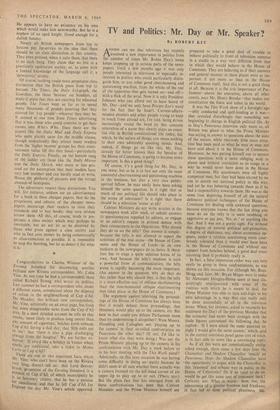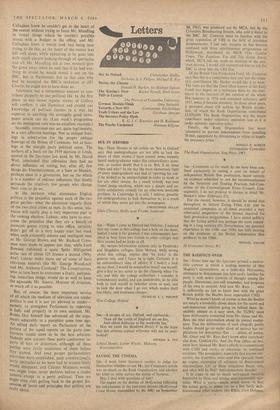TV and Politics: Mr. Day or Mr. Speaker?
By ROBERT KEE
A NYONE can see that television has recently lAassumed a new importance in politics from the number of times Mr. Robin Day's name keeps cropping up in serious parts of the news- papers. Until a few months ago it was only people interested in television or especially in- terested in politics who could particularly distin- guish him, or any other good chairmanning and questioning machine, from the whole of the rest of the apparatus that gets turned on—and off— with a flick of the wrist. Now it is only President Johnson who can afford not to have heard of Mr. Day—and we only have Private Eye's word for the fact that he hasn't. Current-affairs- minded planters and other people trying to keep in touch from abroad are, I'm told, being driven increasingly round the bend by this constant reiteration of a name that clearly plays an essen- tial role in British constitutional life today, but which, by the nature of things, can mean nothing to their own admirably questing minds. And, indeed, if things go on like this, Mr. Day, already far better known than the Speaker of the House of Commons, is going to become more important. Is this a good thing?
Of course, it's a good thing for Mr. Day, in one sense, but as he is in fact not only the most successful chairmanning and questioning machine in the business, but also a very nice public- spirited fellow, he may easily have been asking himself the same question. Is it right that so much of our political life should take place in the arena of television? Is it right that there should be a television 'arena' at all?
Cabinet Ministers do not write articles in the newspapers week after week, or submit answers ta questionnaires supplied by editors, or engage at an editor's request in printed debate with their counterparts in the Opposition. Why should they do so on the telly? One answer is simple: because the telly is not allowed to report the activities of the real arena—ft* House of Com- mons and the House of Lords—in its own 'medium as the newspapers do in theirs. It there- fore has to stage a quite separate ?Irene of its own. And because the telly's medium is Such a powerful form of communication, the telly arena is rapidly becoming the more important. (An answer to the question, why do they do this rather than why should they, is that the telly is a more effective way of oblique electioneering than the time-honoured oblique electioneering that takes place in the House of Commons.) The argument against televising the proceed- ings of the House of Commons has always been that it would debase those proceedings, that Members would play up to the camera, etc. But how in fact could you debase Parliament more than by undermining it altogether? Were Messrs. Maudling and Callaghan not 'playing up to the camera' in their so-called confrontation on Panorama the other day? (If nof, I'd like to know what else they were doing.) Was not the Prime Minister playing up to the camera in his confrontation with Mr. Day a week before or in his later meeting with the This Week panel? Admittedly, on this later occasion he was having some difficulty in doing so—partly because he didn't seem at all sure whether there actually was a camera focused on the left-hand corner of ;t:n.is upper lip to play up to or not. (There was.) But the plain fact that has emerged from all these confrontations has been that Cabinet Ministers and the Prime Minister himself are prepared to take a great deal of trouble to behave politically in front of television cameras in a studib in a way very different from that in which they would behave in the House of Commons. They are behaving as if their answers and general manner in these places were as im- portant if not more so than in the House of Commons itself. And this is not a good thing at all. Because it is the sole importance of Par- liament—above the executive, above all other courts, pace Mr. Henry Brooke—that makes our constitution the finest and safest in the world.
It was the This Week show of a fortnight ago —ably conducted and spell-binding as it was— that revealed disturbingly that something was beginning to change in English political life. As in Day's Panorama interview only more so, all Britain was glued to what the Prime Minister was saying in answer to questions about the state of the nation, while relatively little mass atten- tion had been paid to what he may or may not have said about it in the House of Commons. Moreover, he was putting himself out to answer these questions with a more obliging wish to please and without restriction as to range in a way he would never have done in the House of Commons. His questioners were all highly competent men, but they had been elected by no one to search out national policy in this way, and yet he was behaving towards them as if he had a responsibility towards them. He was at the same time depriving himself of all the natural defensive political techniques of the House of Commons for dealing with awkward questions, because everyone knows that the last thing you must do on the telly is to seem snubbing or aggressive or say just, 'No, sir,' or anything like that. And it was not a pretty sight. For without this degree of natural political self-protection, a degree of shakiness, say, about economics ap- pears, under a ruthless questioning more cour- teously tolerated than it would ever have been in the House of Commons and without any support from benches behind, a good deal more alarming than it probably really is.
In fact, a false impression either way can very easily be given in these confrontations, as was shown on this occasion. For although Mr. Rees- Mogg and, later, Mr. Bryan Magee were to make Sir Alexander Douglas-Home seem at least dis- quietingly unacquainted with some of the realities with which he is meant to deal, the Prime Minister was able to turn anti-logic to his own advantage in a way that can really only be done successfully at all in the television arena. When, for instance, asked to reconcile his statement (to Day) of the previous Monday that the economy had never been stronger with the trade figures announced the following day, he replied: 'If I were asked the same question to- night I would give the same answer,' which, said in the correct television panel game sort of voice, is in fact able to seem like a convincing reply.
As if all this were not constitutionally undig- nified enough, there came a few days later the Chancellor and Shadow Chancellor 'match' on Panorama. Does the Shadow Chancellor have the opportunity to argue with the Chancellor in this 'reasoned' and urbane way in public in the House of Ccfmmons? Or If he tried to do so, would he get this same sort of treatment back? Certainly not. What is worse: here, too, the appearance of a greater freedom and frankness in fact led to deep political phoniness. Mr. Callaghan knew he couldn't get to the heart of the matter without trying to force Mr. Maudling to reveal things which he couldn't possibly reveal with a Budget in the offing, and Mr. Callaghan knew it would look bad being seen trying to do this, so the heart of the matter was left well alone, while appearing to be gone into with much sincere looking-through of spectacles and all. Mr. Maudling did at one moment give the game away when he said that if he had any- thing to reveal he would reveal it not on the BBC, but in Parliament, but in that case why had he accepted the BBC's invitation at all? Clearly, he ought not to have done so.
Television has a tremendous amount to con- tribute properly to our political life. In the first place, as any recent regular viewer of Gallery will confirm, it can illuminate and extend our knowledge of political factors in a way far superior to anything the averagely good news- paper article can do. (Last week's programme on the immigrant vote was an excellent example.) • Secondly, television can act, quite legitimately, as a very effective hustings. Not as oblique hust- ings in substitution for the proper oblique hustings of the House of Commons, but as hust- ings in the straight party political sense. The authors of a book on the 1959 election in Leeds, quoted in the Spectator last week by Mr. David Watt, concluded that television then had no direct influence on voting, but, after all, few things do. Unemployment, or a Suez or Munich, perhaps once in a generation, but on the whole it is a number of indirect influences that finally. persuade the relatively few people who change their vote to do so.
At the moment what dominates English politics is the prejudice against each of the two great parties—what the electorate vaguely think of the two rival crews as men. In this sense, tele- vision will surely play a very important part in the coming election. Labour, who have to over- come the prejudice that they are a bunch of insincere goons trying to take office, certainly didn't get off to a very happy start last week When such eminently sincere and intelligent men, as Mr. George Brown and Mr. Richard Cross- man were made to appear just that, while Lord Bowden exhibited a quite Spike Milliganish pulse rate of about 125 frames a second. (Why don't Labour make more use of some of their television naturals like Mr. George Woodcock and Mr. Anthony Crosland? The Conservatives, Who in turn have to overcome a fruity, patronis- ing, boss-class image, would do as well to keep the agreeable Mr. Amery, Minister of Aviation, as much off it as possible.
But, of course, the most important service of all which the medium of television can render Politics is one it is not yet allowed to render— namely, to strengthen Parliament by reporting it fully and properly in its own medium. Mr. Robin Day himself has advanced all the argu- ments admirably in a pamphlet some time ago. An edited daily report on Parliament on the Pattern of the taped reports on the party con- ferences would seem to be the best solution. Nobody now accuses these party conference re- ports of bias or distortion, although all three partieis were fairly suspicious of them before they started. And once proper parliamentary television were established, such constitutionally sorry spectacles as we have had to witness lately would disappear, and Cabinet Ministers would, one might hope, never perform before,a studio camera except in a party political. Then we might even start getting back to the proper dis- cussion of issues and principles that politics are really about.



































 Previous page
Previous page